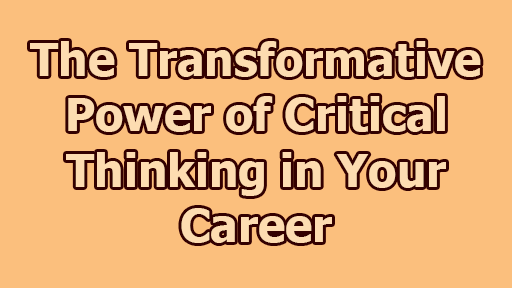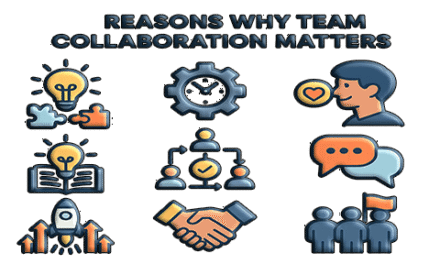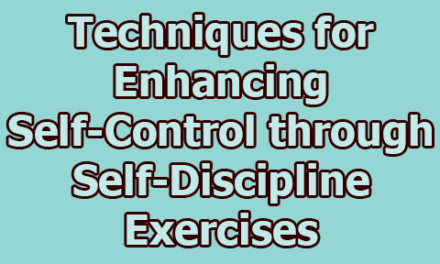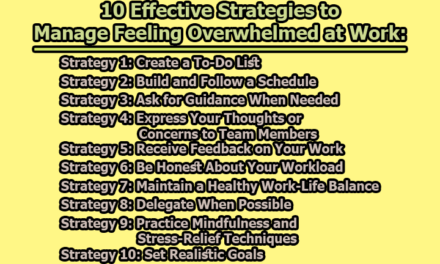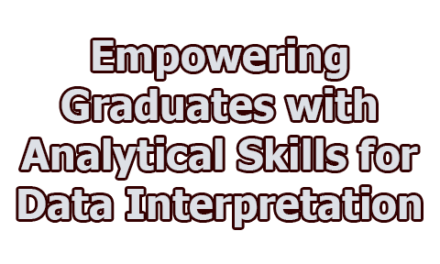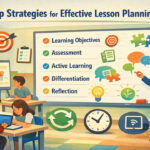The Transformative Power of Critical Thinking in Your Career:
In today’s rapidly changing and competitive world, the ability to think critically is not just a valuable skill; it’s a necessity for success in any career. Critical thinking is the process of analyzing, evaluating, and synthesizing information to make well-informed decisions and solve complex problems (Facione, 2015). It goes beyond simply acquiring knowledge; it involves the application of knowledge to real-world situations. In this article, we will explore the transformative power of critical thinking in your career.
The Foundation of Critical Thinking:
Before delving into how critical thinking applies to specific careers, let’s first establish the foundational elements of critical thinking. Critical thinking involves several key components (Paul & Elder, 2006):
- Analysis: The ability to break down complex problems or information into smaller, manageable parts for examination.
- Evaluation: The capacity to assess the credibility, relevance, and quality of information or arguments.
- Synthesis: The skill of combining different pieces of information, ideas, or concepts to form new insights or solutions.
- Inference: The ability to draw logical and well-founded conclusions from available information.
- Problem-solving: The process of identifying, defining, and resolving issues or challenges effectively.
- Decision-making: The art of making choices based on a careful evaluation of options and potential consequences.
Now, let’s explore how these critical thinking components can be applied across various careers.
1. Business and Management: Critical thinking is the cornerstone of effective decision-making and problem-solving in the business world. Business professionals must analyze market trends, evaluate competitors, and synthesize data to devise successful strategies (Paul & Binker, 2017). In addition, critical thinking plays a pivotal role in risk assessment and management. Whether you’re a manager, entrepreneur, or consultant, the ability to think critically gives you a competitive edge in the business arena.
2. Healthcare: In the field of healthcare, critical thinking is a matter of life and death. Healthcare professionals, including doctors, nurses, and pharmacists, must make critical decisions about patient care every day (Papathanasiou et al., 2014). They need to analyze symptoms, evaluate test results, and synthesize medical knowledge to diagnose and treat patients effectively. Critical thinking ensures that healthcare providers offer the best possible care and adapt to new medical developments.
3. Education: For educators, critical thinking is not only crucial for their students but also for their own professional development. Teachers and professors must design engaging and effective lesson plans that encourage critical thinking in their students (Brookfield, 2015). They must analyze their teaching methods, evaluate student progress, and synthesize feedback to continually improve their approaches. Moreover, educational administrators must think critically to make decisions about curriculum development, resource allocation, and school policies.
4. Technology and Engineering: In the rapidly evolving fields of technology and engineering, critical thinking is indispensable. Engineers must analyze complex systems, evaluate design options, and synthesize solutions to build safe and efficient products (Bucciarelli, 2008). Software developers must think critically to debug code, optimize algorithms, and create innovative applications. In technology and engineering, the ability to troubleshoot and problem-solve is highly valued.
5. Law and Criminal Justice: Critical thinking is at the heart of legal practice and criminal justice. Lawyers must analyze case details, evaluate evidence, and synthesize legal arguments to advocate effectively for their clients (Mauet, 2017). Judges need strong critical thinking skills to interpret and apply the law impartially. In criminal justice, investigators and forensic experts rely on critical thinking to solve crimes by analyzing evidence, evaluating witness statements, and inferring motives.
6. Creative Arts and Design: Even in fields traditionally associated with creativity, critical thinking is essential. Artists, designers, and writers must analyze their audiences, evaluate the effectiveness of their work, and synthesize new ideas (Root-Bernstein & Root-Bernstein, 2010). Whether it’s composing a symphony, designing a building, or crafting a novel, critical thinking helps creators refine their craft and connect with their audiences.
7. Social Sciences and Research: In research-driven professions such as psychology, sociology, and economics, critical thinking is the engine that propels discoveries. Researchers must analyze existing theories, evaluate data, and synthesize findings to contribute new knowledge to their fields (Halpern, 2013). Critical thinking allows them to design rigorous experiments, make informed hypotheses, and draw meaningful conclusions.
8. Journalism and Media: In the field of journalism and media, critical thinking is the compass that guides reporters, editors, and broadcasters through a complex landscape of information (Kovach & Rosenstiel, 2007). Journalists must analyze sources, evaluate the credibility of information, and synthesize news stories that provide an accurate and balanced view of events. Critical thinking helps them navigate the ever-changing media landscape and deliver insightful, well-researched content to the public.
9. Environmental Science and Conservation: Environmental scientists and conservationists rely on critical thinking to address the pressing challenges of climate change, biodiversity loss, and resource management (Bottrill et al., 2014). They analyze data, evaluate the impact of human activities on ecosystems, and synthesize strategies to protect and restore the environment. Critical thinking in this field leads to innovative solutions that balance ecological sustainability with human needs.
10. Finance and Investment: In the world of finance and investment, critical thinking is a fundamental skill for making sound financial decisions (Damodaran, 2012). Financial analysts must analyze economic data, evaluate the performance of investment options, and synthesize strategies to maximize returns while managing risks. Critical thinking is the key to identifying investment opportunities, understanding market trends, and making informed choices in a complex financial landscape.
11. Marketing and Advertising: Marketing and advertising professionals harness critical thinking to create effective campaigns that resonate with target audiences (Solomon et al., 2018). They analyze consumer behavior, evaluate market trends, and synthesize creative strategies to promote products and services. Critical thinking in marketing and advertising leads to innovative and compelling campaigns that capture consumer attention and drive business success.
12. Human Resources and Talent Management: Critical thinking is integral to human resources and talent management (Mathis & Jackson, 2018). HR professionals analyze workforce data, evaluate employee performance, and synthesize strategies for recruitment, training, and retention. Critical thinking helps organizations make informed decisions about staffing, organizational culture, and employee development, ultimately driving productivity and success.
13. Politics and Public Policy: In the realm of politics and public policy, critical thinking is essential for policymakers, analysts, and advocates (Dye, 2017). They analyze legislative proposals, evaluate the impact of policies, and synthesize evidence-based solutions to address societal challenges. Critical thinking shapes effective governance, fosters informed decision-making, and promotes the development of policies that benefit communities and nations.
14. Sales and Customer Relations: Sales professionals rely on critical thinking to understand customer needs, evaluate product offerings, and synthesize persuasive strategies to close deals (Ingram & LaForge, 2018). Critical thinking enables salespeople to adapt to customer preferences, address objections, and build strong relationships, leading to increased sales and customer satisfaction.
15. Hospitality and Tourism: In the hospitality and tourism industry, critical thinking is central to delivering exceptional customer experiences (Reid & Bojanic, 2009). Hotel managers, tour operators, and restaurant owners analyze guest feedback, evaluate service quality, and synthesize strategies to enhance the overall visitor experience. Critical thinking in this field leads to innovations in guest services, ensuring the success and reputation of businesses in the industry.
In conclusion, critical thinking is not confined to any single career path; it is a universal skill that enhances your capabilities in any field you choose to pursue (Ennis, 2011). It empowers you to analyze, evaluate, and synthesize information effectively, making you a more adept problem solver and decision-maker. Moreover, critical thinking is a lifelong journey. It’s not a skill you acquire and leave on the shelf; it’s a mindset that continually evolves and deepens.
To excel in your career, regardless of the industry, cultivate your critical thinking skills. Seek opportunities to analyze, evaluate, and synthesize information. Embrace challenges and view them as opportunities to sharpen your problem-solving abilities. Remember that critical thinking is not just about finding answers; it’s about asking the right questions.
As you navigate your professional journey, you’ll find that critical thinking sets you apart from the crowd. It equips you with the tools to adapt to change, make informed decisions, and innovate in your field. In a world where information is abundant but wisdom is scarce, critical thinking is your compass, guiding you toward success and fulfillment in your career.
References:
- Bottrill, M. C., Joseph, L. N., Carwardine, J., Bode, M., Cook, C., Game, E. T., … & Possingham, H. P. (2014). Is conservation triage just smart decision-making? Trends in Ecology & Evolution, 29(11), 649-654.
- Brookfield, S. D. (2015). The skillful teacher: On technique, trust, and responsiveness in the classroom. Jossey-Bass.
- Bucciarelli, L. L. (2008). Designing engineers. MIT Press.
- Damodaran, A. (2012). Investment valuation: Tools and techniques for determining the value of any asset. John Wiley & Sons.
- Dye, T. R. (2017). Understanding public policy. Pearson.
- Ennis, R. H. (2011). The nature of critical thinking: An outline of critical thinking dispositions and abilities. University of Illinois.
- Facione, P. A. (2015). Critical thinking: What it is and why it counts. Insight Assessment.
- Halpern, D. F. (2013). Thought and knowledge: An introduction to critical thinking. Psychology Press.
- Ingram, T. N., & LaForge, R. W. (2018). Professional selling: A trust-based approach. Cengage Learning.
- Kovach, B., & Rosenstiel, T. (2007). The elements of journalism: What newspeople should know and the public should expect. Three Rivers Press.
- Mauet, T. A. (2017). Fundamentals of trial techniques. Wolters Kluwer.
- Mathis, R. L., & Jackson, J. H. (2018). Human resource management: Essential perspectives. Cengage Learning.
- Paul, R., & Elder, L. (2006). Critical thinking: The nature of critical and creative thought. Journal of Developmental Education, 30(2), 34-35.
- Paul, R., & Binker, A. J. (2017). Critical thinking in business. Journal of Business Education, 5(1), 118-132.
- Papathanasiou, I., Kotrotsiou, S., & Bletsa, V. (2014). Nursing documentation and recording systems of nursing care. Health Science Journal, 8(2), 164-175.
- Reid, R. D., & Bojanic, D. C. (2009). Hospitality marketing management. John Wiley & Sons.
- Root-Bernstein, R., & Root-Bernstein, M. (2010). Sparks of genius: The thirteen thinking tools of the world’s most creative people. Houghton Mifflin Harcourt.
- Solomon, M. R., Marshall, G. W., & Stuart, E. W. (2018). Marketing: Real people, real choices. Pearson.

Library Lecturer at Nurul Amin Degree College

